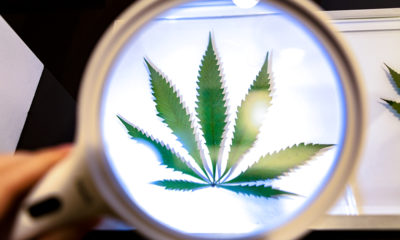
Medical
Cannabis Might Be Anti-Inflammatory, But Can It Treat a Jarisch-Herxheimer Reaction?
Despite the rumors online, there’s no science to support the suggestion that cannabis can treat a Jarisch-Herxheimer reaction. However, there’s growing research into the anti-inflammatory powers of cannabis, which might suggest possible relief from the uncomfortable condition.
In an age of self-diagnosis, search engines are flooded with “natural remedies” and homeopathic healing tips. One new trending topic amongst cannabis health and wellness blogs is whether or not the herb successfully quells symptoms of a Jarisch-Herxheimer reaction (JHR).
Unfortunately, when it comes to using cannabis to treat JHR, the scientific evidence is non-existent. While cannabis has vast therapeutic potential in a variety of conditions, research as to how the plant impacts the uncomfortable condition is few and far between.
Still, there is a growing body of evidence in favor of cannabis’s strong anti-inflammatory properties and ability to assist the immune system.
What Is a Jarisch-Herxheimer Reaction?
“Inflammation” is often akin to a dirty word in today’s health landscape. However, without this vital response, infection would make quick work of the delicate tissues of the body. After getting a cut or an infection, inflammation is the tool that prevents disease from spreading, potentially saving us from severe illness.
So, why does inflammation get such a bad reputation? Sadly to say, this life-saving response can sometimes run wild. Sometimes referred to as “bacterial die-off”, the Jarisch-Herxheimer reaction is a temporary hyper-inflammatory response triggered by intensive antibiotic treatment used to treat infectious diseases. This rapid immune response contributes to aches, pain, stiffness and general discomfort.
While JHR is used clinically to describe a severe immune response to antibiotic treatments, an ill feeling caused by “bacterial or fungal die-off” is an ailment now oft-cited by health blogs and natural health practitioners, without substantial scientific backing.
JHR is most commonly experienced within 24 to 48 hours after patients receive treatment for infections that involve spirochete bacteria, such as Lyme disease and syphilis. As a 2013 review published in the journal Travel Medicine and Infectious Disease suggests, once antibiotics take effect, bacterial cells release endotoxins which trigger a rapid immune response in the human body.
In an effort to address the sudden onslaught of toxic bacterial particles, the immune system kicks into overdrive. This causes a sudden spike in inflammation as well as fever, sweating, chills, aches, an increase in heart rate and lower blood pressure. Needless to say, JHR is not fun.
Cannabis Appears to Help With Inflammation
With such unpleasant side effects, it’s no wonder that patients seek out alternative forms of relief. Yet, to date, there have been no scientific studies on whether or not cannabis medicines can attenuate a Jarisch-Herxheimer reaction.
However, when it comes to inflammation — a primary complaint amongst those experiencing JHR — emerging evidence does provide some hints as to whether or not the herb may be helpful.
How? The active compounds in the cannabis plant, called cannabinoids, may prove to be immune-modulators. As it turns out, both plant and human-derived cannabinoids have been found to alter immune response, potentially halting pro-inflammatory reactions.
As a 2009 review published in Future Medical Chemistry found, cannabinoid receptors 1 and 2 have both been found on immune cells. It is the presence of these receptor sites that gives molecules like tetrahydrocannabinol (THC) and cannabidiol (CBD) places to “land” in the human body and make an impact.
Fascinatingly, the review states that the cannabinoid receptor 2 (CB2) is even found on mast cells, which are the immune cells responsible for triggering the inflammatory response in connective tissues.
However, not all cannabis compounds have an equal potential in terms of relieving inflammation. As the above 2009 review discusses, CBD appears to be the most effective when it comes to calming inflammation. In the study, CBD was shown to indirectly activate the CB2 receptor, suppressing the immune system and inspiring an anti-inflammatory effect.
Cannabinoids May be Helpful for Endotoxic Shock
Compounds in the cannabis plant may be useful anti-inflammatories, but inflammation triggered by bacterial infection is its own unique beast. Fortunately, while more research is sorely needed, early rodent studies have suggested that the therapeutic plant may be helpful for managing inflammation from microbial irritants.
Research published in 2005 by Nature Reviews Immunology cited evidence that cannabinoids alter immune-cell activation that occurs in response to inflammatory stimuli, including the release of endotoxins. Endotoxins are chemicals that bacteria release when they die — and it is these endotoxins that make JHR so uncomfortable.
Research on CBD has also shown positive results in treating inflammation caused by infection. In a 2011 study published in the Journal of Neuroinflammation, CBD prevented the dilation of blood vessels and reduced the inflammatory response in rodents with sepsis. Sepsis is a life-threatening inflammatory reaction caused by excessive endotoxin release after a severe bacterial infection.
“These data highlight the anti-inflammatory and vascular-stabilizing effects of CBD in endotoxic shock and suggest a possible beneficial effect of this natural cannabinoid,” wrote the authors.
Exactly whether or not this “beneficial effect” works in humans is unknown.
Still Much to Learn About Cannabis & Infectious Disease
While research on whether or not cannabis improves symptoms of Jarisch-Herxheimer reaction is non-existent, there is a growing body of evidence that suggests that the plant may be a powerful tool for easing inflammation and calming an overactive immune system.
However, it is also important to note that the results research on cannabis and immunology is far from black and white. While some cannabinoids like CBD have demonstrated potent anti-inflammatory properties and decrease inflammation, some studies have shown that THC, the primary psychoactive in the cannabis plant, may have an opposing effect.
For example, a 1994 study published in the Journal of Pharmacology and Experimental Therapeutics found that treatment in rodents experiencing endotoxic stress increased the production of a certain class of pro-inflammatory proteins. However, a later study published in the same journal found that THC actually decreased the presence of other pro-inflammatory proteins in endotoxin-exposed mice.
What do these discrepancies mean in terms of the interaction between cannabis and the immune system? Unfortunately, there are no easy answers. While the cannabis plant has shown potential as an anti-inflammatory tool, only time and more research will shed light on whether or not the herb is helpful for run-away inflammation caused by ailments like Jarisch-Herxheimer.
TELL US, do you use cannabis as an anti-inflammatory?






















